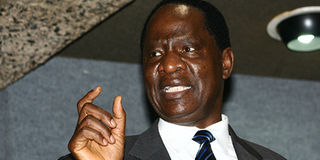Civil servants without certificates

Photo/FILE
Public Service minister Dalmas Otieno was the chief guest during the release of the audit which also showed men dominate the public service at 72 per cent compared to women (28 per cent).
Some public servants hold no certificates at all, while a majority — nearly 170,000 — are Form IV graduates, an audit shows.
The Ministry of Public Service findings released on Tuesday put the number of public servants with bachelors degree at about 20,000.
There are more than 500,000 public servants in the country. Most teachers, about 170,000 are also Form IV leavers, while 50,000 are university degree holders.
About 30,000 teachers are Form IV graduates while about 7,000 are diploma holders.
The Teachers Service Commission also still has Standard Seven — Certificate of Primary Education, Kenya Advance Prime Education and Kenya Certificate of Prime Education employees in its payroll.
No certificates
Some teachers, the audit, indicate have no certificate, while about 2,000 teachers hold the Kenya Junior Secondary Education (Form II) certificate. A few have masters degrees.
Conducted as part of rapid results initiative, the audit released at the Kenya Institute of Administration showed that a number of public servants have no certificate at all, a few have diploma while the number of those with doctorate degrees is insignificant.
Public Service minister Dalmas Otieno was the chief guest during the release of the audit which also showed men dominate the public service at 72 per cent compared to women (28 per cent). Women however form 46 per cent of teachers and men (54).
The goal of the research was to determine the human resource capacity in the civil service and TSC to inform the implementation of the national and county governing structures as envisaged in the constitution.
Article 81 of the constitution requires that not more than two-thirds of the members of the elective public bodies shall be of the same gender.
The director of management consultancy services at the Ministry of Public Service Mr Henry Ogega who led the audit said they also collected data on staff distribution, ethnicity, age profile, skills profile and employment trends since 2005 and gave the results to permanent secretaries.
“It is necessary to maintain and update staff audit data on regular basis in the public service for decision making,” Mr Ogega said.
The findings, he said, would be discussed with stake holders including Public Service Commission, TSC, PS’s, Vision 2030 secretariat, Committee on the Implementation of the Constitution and the National Cohesion and Integration Commission.
The results are to further assist in counties’ staffing and organizational structures.
Mr Otieno said the staff audit would be extended to Local authorities and parastatals despite lack of IT system capturing staff data in the organisations.
PS Titus Ndambuki said the audit has been presented to the task force on devolved government.
“The audit is key in deployment of staff. It will determine what will happen to the counties which have a shortage and those with excess,” Mr Ndambuki said.
Mr Ndambuki and Mr Otieno called for awareness of public servants on constitution especially Chapter Six on leadership and integrity.
Accompanied by assistant minister Aden Sugow, Mr Otieno warned that civil servants who don’t deliver services risked being sued.
“Remember the new constitution has empowered Kenyans with the right to demand for quality services. Public servants have to change their mindsets to serve,” he said.




